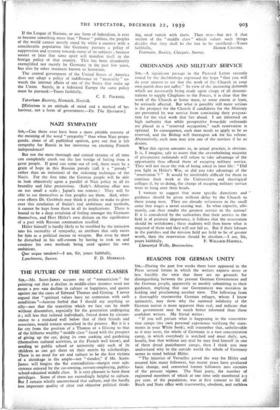ORDINANDS AND MILITARY SERVICE SIR,—A significant passage in the Pastoral
Letter recently issued by the Archbishops expressed the hope " that you will do your utmost to see that the work of the Church in your own parish does not suffer." In view of the increasing demands which are necessarily being made upon clergy of all denomi- nations to supply Chaplains to the Forces, it is clear that the work of the Church at home must, to some extent at least, be seriously affected. But what is possibly still more serious is the prospect for the Church if candidates for the Ministry are prevented by war service from continuing their prepara- tion for the vital work that lies ahead. I am informed on high authority that while prospective bona-fide ordinands are placed in a " reserved occupation," such reservation is optional. In consequence, each man needs to apply to be so reserved, and the Bishop will thereupon ask for his release. Alternatively, each man may join one of the services if he so desires.
What this option amounts to, in actual practice, is obvious. It is, I imagine, safe to assert that the overwhelming majority of prospective ordinands will refuse to take advantage of the opportunity thus offered them of escaping military service. They will not incur the risk of being asked in later life: " Did you fight in Hitler's War, or did you take advantage of the ' reservation '? " It would be intolerably difficult for them to continue their work at the Universities and theological colleges if, by so doing, the charge of escaping military service were to hang over their heads.
I venture to suggest that more specific directions and guidance should be given without delay by the Church to these young men. They are already volunteers in the small army that wages a never ceasing war. In what capacity, ulti- mately, can they render the greatest service to the nation? If it is considered by the authorities that their service in the field is of primary importance, it follows that the reservation should be withdrawn ; these students will then know what is required of them and they will not fail us. But if their labours in the parishes and the mission field are held to be of greater worth, then the reservation should be absolute.—I am, Sir,
yours faithfully, F. WALIACE-HADRILL. Llanwrtyd Wells, Breconshire.




































 Previous page
Previous page